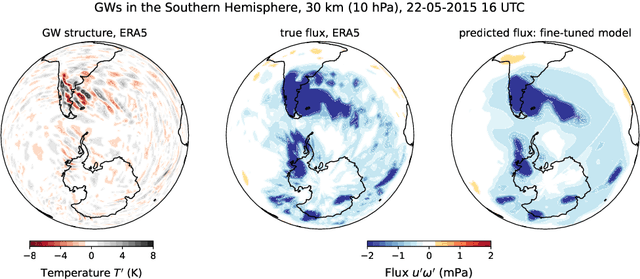Aditi Sheshadri
Finetuning AI Foundation Models to Develop Subgrid-Scale Parameterizations: A Case Study on Atmospheric Gravity Waves
Sep 04, 2025



Abstract:Global climate models parameterize a range of atmospheric-oceanic processes like gravity waves, clouds, moist convection, and turbulence that cannot be sufficiently resolved. These subgrid-scale closures for unresolved processes are a leading source of model uncertainty. Here, we present a new approach to developing machine learning parameterizations of small-scale climate processes by fine-tuning a pre-trained AI foundation model (FM). FMs are largely unexplored in climate research. A pre-trained encoder-decoder from a 2.3 billion parameter FM (NASA and IBM Research's Prithvi WxC) -- which contains a latent probabilistic representation of atmospheric evolution -- is fine-tuned (or reused) to create a deep learning parameterization for atmospheric gravity waves (GWs). The parameterization captures GW effects for a coarse-resolution climate model by learning the fluxes from an atmospheric reanalysis with 10 times finer resolution. A comparison of monthly averages and instantaneous evolution with a machine learning model baseline (an Attention U-Net) reveals superior predictive performance of the FM parameterization throughout the atmosphere, even in regions excluded from pre-training. This performance boost is quantified using the Hellinger distance, which is 0.11 for the baseline and 0.06 for the fine-tuned model. Our findings emphasize the versatility and reusability of FMs, which could be used to accomplish a range of atmosphere- and climate-related applications, leading the way for the creation of observations-driven and physically accurate parameterizations for more earth-system processes.
WxC-Bench: A Novel Dataset for Weather and Climate Downstream Tasks
Dec 03, 2024



Abstract:High-quality machine learning (ML)-ready datasets play a foundational role in developing new artificial intelligence (AI) models or fine-tuning existing models for scientific applications such as weather and climate analysis. Unfortunately, despite the growing development of new deep learning models for weather and climate, there is a scarcity of curated, pre-processed machine learning (ML)-ready datasets. Curating such high-quality datasets for developing new models is challenging particularly because the modality of the input data varies significantly for different downstream tasks addressing different atmospheric scales (spatial and temporal). Here we introduce WxC-Bench (Weather and Climate Bench), a multi-modal dataset designed to support the development of generalizable AI models for downstream use-cases in weather and climate research. WxC-Bench is designed as a dataset of datasets for developing ML-models for a complex weather and climate system, addressing selected downstream tasks as machine learning phenomenon. WxC-Bench encompasses several atmospheric processes from meso-$\beta$ (20 - 200 km) scale to synoptic scales (2500 km), such as aviation turbulence, hurricane intensity and track monitoring, weather analog search, gravity wave parameterization, and natural language report generation. We provide a comprehensive description of the dataset and also present a technical validation for baseline analysis. The dataset and code to prepare the ML-ready data have been made publicly available on Hugging Face -- https://huggingface.co/datasets/nasa-impact/WxC-Bench
Machine Learning Global Simulation of Nonlocal Gravity Wave Propagation
Jun 20, 2024Abstract:Global climate models typically operate at a grid resolution of hundreds of kilometers and fail to resolve atmospheric mesoscale processes, e.g., clouds, precipitation, and gravity waves (GWs). Model representation of these processes and their sources is essential to the global circulation and planetary energy budget, but subgrid scale contributions from these processes are often only approximately represented in models using parameterizations. These parameterizations are subject to approximations and idealizations, which limit their capability and accuracy. The most drastic of these approximations is the "single-column approximation" which completely neglects the horizontal evolution of these processes, resulting in key biases in current climate models. With a focus on atmospheric GWs, we present the first-ever global simulation of atmospheric GW fluxes using machine learning (ML) models trained on the WINDSET dataset to emulate global GW emulation in the atmosphere, as an alternative to traditional single-column parameterizations. Using an Attention U-Net-based architecture trained on globally resolved GW momentum fluxes, we illustrate the importance and effectiveness of global nonlocality, when simulating GWs using data-driven schemes.
 Add to Chrome
Add to Chrome Add to Firefox
Add to Firefox Add to Edge
Add to Edge